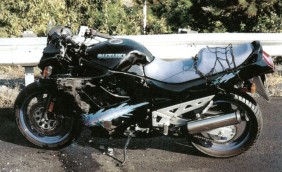A motorcycle, like a passenger car, is capable of high speeds and must share the road with other vehicles. However, unlike passenger cars, motorcycles are capable of rapid accelerations, offer little protection to the operator during a collision and require special skills to maneuver effectively. This is due in part, to the use of separate front and rear brake controls and the physics of a motorcycle (i.e. gyroscopic effects of the front wheel), which necessitate a counter-steering technique to initiate a rapid change of direction. A motorcycle is also much lighter than typical passenger vehicles, and do not provide as much protection for their occupants. Motorcycle accidents may also involve a biomechanical analysis of whether a helmet would have prevented an injury, visibility to other motorists, as well as many of the principles used in conventional four-wheeled vehicle accident reconstruction.
Our engineers have been assisting attorneys and insurance representatives in investigating accidents since 1990. We have a highly qualified staff of engineers with advanced degrees from top-tier universities who have provided testimony on behalf of both plaintiffs and defendants at trial


